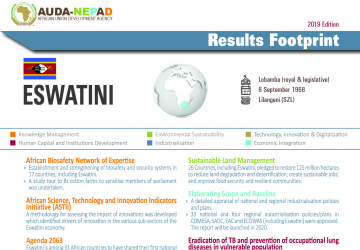 Eswatini
Eswatini
Official Name: Kingdom of Swaziland
Capital: Lobamba (royal and legislative) and Mbabane (administrative)
Independence Day: 6 September 1968
Currency: Lilangeni (SZL)
Key Result
120 women benefited from entrepreneurship training and the development of three community gardens; the women were also trained in Vaseline and soap production.
Swaziland is also among the first 12 countries to have domesticated an adapted version of the African Union Model on Medical Products in 2017.
85 Million hectares of land on the continent have been committed for restoration through the application of the restoration opportunities assessment methodology by 2030. To-date, Swaziland has committed 0.5 million hectares.
About 880 000 community members and over 80 policy makers and climate change practitioners, were sensitized on the link between agriculture and climate change through the media. In addition, 1 500 farmers were trained on climate smart practices. A compendium on Climate Smart Agriculture has been developed for the implementation of CSA in Swaziland.
Related
Projects

A critical AU Model Law aimed at harmonizing medical products regulatory systems in Africa was endorsed by African Heads of State and Government at the January 2016 AU Summit in Addis Ababa, Ethiopia. The AU Model Law will contribute towards accelerate the regulation of safe, quality and affordable medical products and technologies. Swaziland has embraced and domesticated the AU Model Law and is already utilizing an adapted version.

Measuring the Cost of Hunger in Africa: This study was completed in 4 countries (Egypt, Ethiopia, Swaziland and Uganda). The overarching objective of the multi-country study led by the AUC, NEPAD, WFP and UNECA, is to catalyse coordinated action and inform the design of nutrition-oriented policy frameworks and programmes, with greater investments to eradicate child undernutrition on the continent.
10 findings from the first phase of the “Measuring the Cost of hunger” study:
- There are more stunted children in Africa today than there were 20 years ago.
- 69 to 82 per cent of all cases of child undernutrition are not properly treated.
- Most of the health costs associated with undernutrition occur before the child turns one year old
- 4 between 7 and 16 per cent of grade repetitions at schools are associated with stunting.
- Stunted children complete 0.2 to 1.2 years less in school education.
- 8 to 28 per cent of all child mortality is associated with undernutrition.
- Child mortality associated with undernutrition has reduced national workforces by between 1 and 8 per cent
- 40 to 67 per cent of working-age populations suffered from stunting as children.
- The annual costs associated with child undernutrition reach values equivalent to 1.9 to 16.5 per cent of gross domestic product.
- Eliminating stunting in africa is a necessary step for inclusive development on the continent.

CAADP Compact: Swaziland signed the CAADP Compact on 3 – 4 March 2010.
Capacity Building: In July 2015, NEPAD supported Swaziland in conducting an Independent Technical Review (ITR).
Provincial stakeholder consultations were completed as an input to the national CAADP Compact and Investment Plan. And an Agriculture Public Expenditure Review was conducted.
Business Meeting: The business meeting was planned to be held in December 2015.

Project : TAH programme
Description : This is phase I of the continental connectivity programme that focuses on completion and standardisation of the TAH missing links by 2030
Project : Single African Sky phase 1 (design and initial implementation)
Description : Single African Sky is a continental programme that will create a high-level, satellite-based air navigation system for the African continent
Project : Yamoussoukro Decision implementation
Description : Accelerate Yamoussoukro Decision implementation by identifying countries that are ready to fully implement it, and discussing and agreeing with both their governments and airlines to launch the voluntary club on a full membership basis;
Project : ICT Enabling Environment
Description : This programme would improve the environment for the private sectors to invest in high-speed broadband infrastructure
Project : ICT Terrestrial for Connectivity
Description : This programme has two main components: secure each country connection by at least two broadband infrastructure and ensure the access to submarine cable to all landlocked countries
Project : Internet Exchange Point (IXP) programme
Description : The aim of this programme is to provide Africa with adequate internet node exchange to maximise internal traffic


Project Name: Women Empowerment- Women as architects of their own future
Africa Leadership Development Institute (LeadAfrika -Promoting Participation of Women in Decision Making and Leadership)

Mainstreaming Climate Change into National Agricultural and Food Security Investment Plans
• 9 Categories of CSA Technologies/Practices in Zambia for identified
• Draft Compendium of CSA Technologies/Practices produced
• 84 policy makers and climate change practitioners sensitized on the link between agriculture and climate change
• 880 000 people benefited from awareness creation through the media activities
• Number of Farmers group trained on use of CSA technologies


Results (2013 – 2015)
Advocacy and Strengthening of Negotiation Capacities on Post-2015 Development Agenda through the Common African Position (CAP):
• The multi-stakeholder framework of engagement specifically enhanced dialogue towards ensuring the required mass to influence the Post-2015 Global Agenda and Development Goals relevant to the Continent;
• This intervention helped strengthen country and regional level negotiating capacities for the effective incorporation and articulation of Africa’s priorities as enshrined in CAP in the final Global SDGs;
• The project enabled the participation of African stakeholders at the Means of Implementation Engagement, 3rd Financing for Development Conference and the UN General Assembly that adopted the new SDGs. This ensured the incorporation of Africa’s development priorities into the new goals through developing essential negotiation capacities;
• Through the CAP/SDGs space on the Africa Platform for Development Effectiveness (APDev), knowledge products and negotiation documents, as well as, policy briefs where successfully disseminated to the African negotiators in New York and kept the continent’s stakeholders informed of the overall process;
• Development and dissemination of post-2015 Policy Briefs on “Financing and Partnerships” and “Structural Economic Transformation and Inclusive Growth”. These are priorities outlined in the CAP and the policy briefs where utilized in the negotiation process for the African continent.
Global Partnership for Effective Development Cooperation (GPEDC):
• Africa secured the hosting of the 2nd High Level Meeting (HLM) of the Global Partnership. This was attained through robust negotiation and facilitating a common voice from Africa with regards to this critical engagement by the NEPAD Agency. The 2nd HLM will be held in Nairobi Kenya;
• The NEPAD Agency advocated for the full inclusion and participation of Africa’s Regional Economic Communities (RECs) in conducting the 2nd GP Monitoring Exercise. This was a fundamental achievement considering the RECs are the continent’s building blocks with regards to socio-economic transformation;
• The Africa Action Plan on Development Effectiveness (AAP) was granted the status of an official Global Partnership Initiative (GPI) at the Planning Meeting in Brussels. The AAP was developed by the NEPAD Agency in consultation with African multi stakeholders. This has enabled the Agency to successfully mobilize resources towards the implementation of the AAP.

Description : The use of political gravitas and goodwill to unblock and facilitate political bottlenecks affecting the implementation of ICT broadband and optic fibre projects on the continent

you agree to the AUDA-NEPAD Privacy Policy.



